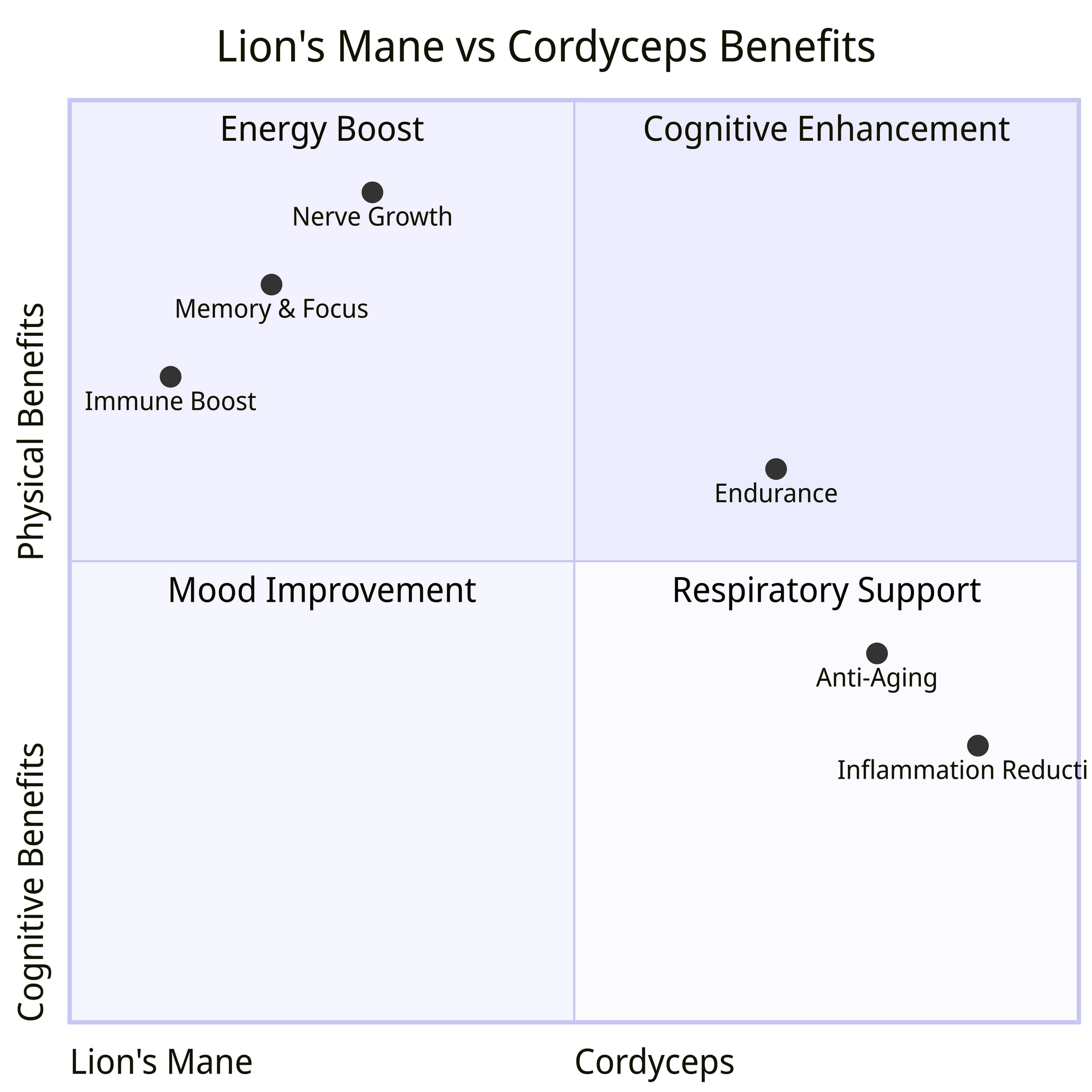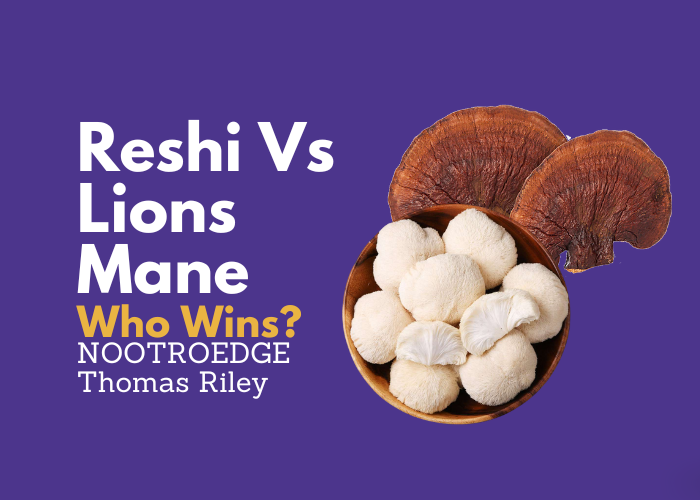Medicinal mushrooms have become hugely popular in recent years, renowned for their potential health and wellness benefits.
In this extensive guide, we'll explore everything you need to know about lion's mane and cordyceps. By the end, you'll understand their unique advantages, proper usage, and how to choose the best Nootropic mushroom for your needs. Let's dive in!
TLDR: Lion's Mane is renowned for enhancing cognitive functions, such as memory and focus, while also supporting nerve health. On the other hand, Cordyceps is prized for boosting energy, endurance, and respiratory health. When choosing between the two, consider your health objectives: Lion's Mane for brain health and Cordyceps for physical vitality. However, combining both can offer synergistic benefits for overall well-being.
An Overview of Lion's Mane
Lion's mane mushroom, known scientifically as Hericium erinaceus, is an edible fungus found in North America, Europe, and Asia. It gets its shaggy mane moniker from the cascade of long, white tendrils resembling a lion's mane.
I love that lion’s mane has been used in traditional Chinese medicine for centuries as a tonic for overall well-being. The Chinese revered it for its brain-boosting and immune-enhancing effects.
Modern research has confirmed many of the lion's mane's traditional benefits. Let's analyze some of the top science-backed advantages:
- Stimulates nerve growth factor (NGF): One of lion’s mane’s most remarkable attributes is its ability to increase NGF, a protein integral to neuron health, communication, and growth. By elevating NGF, lion's mane may enhance cognitive functions like memory, focus, and learning capacity. The effects of nerve growth from Lions Mane can take a little longer to kick in.
- Protects against cognitive decline: Lion's mane contains two unique compounds called hericenones and erinacines which stimulate NGF synthesis. This neuroprotective action shows the potential to slow neurodegenerative diseases like dementia.
- Reduces anxiety and depression: Research indicates lion's mane can improve mood disorders by inhibiting inflammation in parts of the brain associated with anxiety and depression. The relief offered is quite noticeable.
- Boosts immunity: Polysaccharides in lion's mane may stimulate the production of immune cells and protective cytokines involved in regulating inflammation. This immunomodulating effect powerfully fortifies immune response.
I'm especially impressed by the research on lion's mane for supporting nerve regeneration and overall brain optimization. It's clear why this ancient Chinese mushroom medicine has stood the test of time.
Cordyceps Overview
Cordyceps is a fascinating medicinal mushroom with an equally fascinating backstory. Unlike lion's mane, it doesn't resemble an animal. Instead, cordyceps sinensis is a fungi that infects and grows on insect larvae in the wild, taking on a worm-like appearance.
While that might sound unappealing, this unique mushroom has phenomenal health benefits. Cordyceps has been used in Traditional Chinese Medicine for centuries as an adaptogen. Let's analyze some of cordyceps' top science-backed advantages:
- Boosts energy and endurance: Cordyceps increases cellular ATP production, providing an energizing effect. Research shows it can heighten aerobic capacity, endurance, and reduce fatigue during exercise. This makes it very popular among athletes.
- Supports respiratory health: Compounds in cordyceps called cordycepin and polysaccharides can alleviate bronchoconstriction and overproduction of mucus. For this reason, cordyceps is often used to support respiratory function.
- Anti-ageing activity: The antioxidant activity of cordyceps helps combat oxidative stress caused by free radicals. By limiting this type of cellular damage, cordyceps may have anti-aging properties that promote longevity.
- Anti-ageing Cordyceps has natural anti-inflammatory effects by inhibiting inflammatory compounds like nitric oxide. This helps with recovery and protects cardiovascular health by reducing arterial inflammation.
Cordyceps wears many hats as an adaptogenic mushroom. I especially appreciate its energy-boosting properties and respiratory health support. Its traditional use as a “mushroom of immortality” seems well-founded.
Head to Head: Lion's Mane vs Cordyceps
Now that we've covered both mushrooms, let's directly compare lion's mane and cordyceps to highlight their differences:
- Lion's mane is best known for brain health, acting as a nootropic to improve cognition, memory, focus, and nerve growth. Cordyceps is revered for boosting energy, endurance, respiratory function, and longevity.
- Lion's mane has more pronounced effects on mood, reducing depressive symptoms and anxiety. Cordyceps mainly provides a sense of energetic calm and wellbeing through its adaptogenic activity.
- Lion's mane extract seems to have more rapid benefits, with users feeling cognitive gains within weeks. Cordyceps has longer-term effects, gradually enhancing physical performance and resilience over months.
- Lion's mane is very safe with almost no side effects. Cordyceps may cause mild gastric upset in sensitive individuals. However, both are very well-tolerated overall.
- Lion's mane is primarily consumed as an extract or powder. Cordyceps are usually eaten as a whole mushroom or drank as a tea after hot water extraction.

In essence, lion's mane is the premier cognitive enhancer, while cordyceps shines for whole-body adaptogenic benefits. But these mushrooms nicely complement each other when used in tandem!
Cordyceps VS Lion's Mane
by u/Filmmagician in NootropicsDepot
A Reddit thread showing users discussing Cordyceps and Lions Mane.
Dosages and How Much to Take?
Medicinal mushrooms like lion's mane and cordyceps can provide some incredible health benefits, but it's important to consume them properly. Getting the dosage and preparation right ensures you safely obtain the maximum advantages.
For lion's mane, experts often recommend 500-3000mg per day, split into 2 or 3 doses. Start on the lower end of the range and increase slowly to find the amount that works best for you. The effects can take 2-4 weeks to become noticeable. Lion's mane comes in capsules, powders, and tinctures - try different formats to see what you prefer.
With cordyceps, a good starting dosage is 1000-3000mg daily. You can take it in capsules, add the powder to smoothies or tea, or drink cordyceps tea. As with lion's mane, begin with a smaller dose and slowly increase over time.
It's generally safe to take either mushroom daily, but some people may experience digestive upset or headache initially. If this happens, reduce the dosage and build up more gradually. It's always wise to consult a healthcare provider before beginning supplementation, especially if you have any medical conditions.
When purchasing medicinal mushrooms, select products from reputable suppliers to ensure purity and potency. Organic, US-grown mushrooms tend to provide better quality.
While extremely beneficial, medicinal mushrooms work best as part of an overall healthy lifestyle. Be sure to get regular exercise, eat a nutrient-rich diet, manage stress, and get enough sleep. Employing multiple approaches helps maximize your health and wellbeing.
Choosing the Best Medicinal Mushroom for You
When it comes to choosing between lion's mane and cordyceps, consider your specific health goals and needs:
- If you want to optimize brain health and performance, lion's mane with its robust nootropic activity is likely the better fit. Its cognitive enhancement is simply unparalleled among medicinal mushrooms.
- For increased physical vitality, energy, stress adaptation, and respiratory function, cordyceps is hard to beat. Athletes, seniors, and those seeking an immunomodulating lift will benefit most from cordyceps.
- Stacking both mushrooms provides the best of both worlds - brain gains from lion's mane and body benefits courtesy of cordyceps. You'll cover all your bases with this dynamic duo.
As with any supplement, consult a healthcare provider before trying lion's mane or cordyceps, especially if pregnant, nursing, or currently on some from of medication. While quite safe, checking for potential contraindications is wise.
Lion’s Mane for your brain.
— Tony Shields (@freshcaptony) May 4, 2023
Cordyceps for your lungs.
Reishi for your sleep.
Turkey Tail for your immune system.
Mushrooms have superpowers.
Tony Shields discusses various Nootropic Mushrooms on Twitter.
Can you take Lions Mane and Cordyceps together?
Yes, you can take lion's mane and cordyceps mushroom supplements together. The two mushrooms are highly complementary and provide synergistic benefits when combined.
Lion's mane and cordyceps are both adaptogenic mushrooms that help regulate the immune system and reduce inflammation. Lion's mane is excellent for brain health, improving cognitive function, memory, and nerve growth. Meanwhile, cordyceps enhances physical performance, endurance, and oxygen utilization.
Taking lion's mane and cordyceps together allows you to experience the full spectrum of benefits from these medicinal mushrooms. The combination can boost mental clarity, focus, energy levels, exercise capacity, immunity, and more.
Some research suggests certain compounds in cordyceps may increase the bioavailability and absorption of lion's mane. This can lead to enhanced effects from both mushrooms.
There are no known contraindications or adverse interactions between lion's mane and cordyceps. You can safely consume them together by taking capsules, adding mushroom powders to smoothies, or drinking mushroom teas.
What are the benefits of stacking lion's mane and cordyceps?
Stacking lion's mane and cordyceps provides synergistic benefits. Lion's mane contains nerve growth compounds that may improve cordyceps' absorption. Together they can lift mood, reduce anxiety, increase mental clarity, boost immunity, enhance physical stamina and accelerate post-workout recovery. The combination covers both cognitive and physical performance.
When should I take lion's mane and cordyceps for best results?
For maximum advantage, take lion's mane and cordyceps together daily. Consume 1 gram of each mushroom powder or 2 capsules 30-60 minutes before your workout to amplify energy, endurance and strength. You can also take them in the morning to elevate focus, productivity and mood throughout the day. The mushrooms provide sustained benefits with consistent use over time.
What's the best way to take lion's mane and cordyceps?
Lion's mane and cordyceps are available in capsules, powders and extracts. Powders can be blended into smoothies, teas or coffee. Capsules provide an easy way to get standardized doses. Extracts in tinctures deliver compounds efficiently. Combining different formats like capsules and powders can optimize absorption. Choose certified organic supplements from reputable producers.
Are there any side effects or interactions when combining lion's mane and cordyceps?
Lion's mane and cordyceps are generally well-tolerated, with few reported side effects. Start with low doses and increase gradually to avoid digestive upset. Those on medications should consult a doctor, as lion's mane may increase stomach acid production. Monitoring initial reactions helps determine optimum dosing and ensures maximum benefits.
Summary
Lion's mane and cordyceps offer unique evidence-backed advantages. Lion's mane reigns supreme for cognitive optimization. Cordyceps is the premiere adaptogen for whole-body health. Ultimately, choosing the right mushroom depends on your specific needs and goals.
By understanding the science, composition, and proper usage of lion’s mane vs cordyceps, you can harness the full power of these medicinal fungi. Why not explore their benefits today and take your health journey to the next level?
Sources
Pharmacological and therapeutic potential of Cordyceps with special reference to Cordycepin, https://www.ncbi.nlm.nih.gov/pmc/articles/PMC3909570/- Neurotrophic properties of the Lion's mane medicinal mushroom, Hericium erinaceus (Higher Basidiomycetes) from Malaysia, https://pubmed.ncbi.nlm.nih.gov/24266378/
- Therapeutic Potential of Hericium erinaceus for Depressive Disorder, https://www.ncbi.nlm.nih.gov/pmc/articles/PMC6982118/
- Hericium erinaceus (Lion's Mane) mushroom extracts inhibit metastasis of cancer cells to the lung in CT-26 colon cancer-tansplanted mice, https://pubmed.ncbi.nlm.nih.gov/23668749/
- The Anticancer Properties of Cordycepin and Their Underlying Mechanisms, https://www.ncbi.nlm.nih.gov/pmc/articles/PMC6212910/
Venturella, G., Ferraro, V., Cirlincione, F., & Gargano, M. L. (2021). Medicinal Mushrooms: Bioactive Compounds, Use, and Clinical Trials. International Journal of Molecular Sciences, 22(2), 634. https://doi.org/10.3390/ijms22020634 - Lai, P., Naidu, M., Sabaratnam, V., Wong, K., David, R. P., Kuppusamy, U. R., Abdullah, N., & Malek, S. N. A. (2013). Neurotrophic Properties of the Lion’s Mane Medicinal Mushroom, Hericium erinaceus (Higher Basidiomycetes) from Malaysia. International Journal of Medicinal Mushrooms, 15(6), 539–554. https://doi.org/10.1615/intjmedmushr.v15.i6.30
- Chiu, C., Chyau, C., Chin-Chu, C., Lee, L., Chen, W., Liu, J., Lin, W., & Mong, M. (2018). Erinacine A-Enriched Hericium erinaceus Mycelium Produces Antidepressant-Like Effects through Modulating BDNF/PI3K/Akt/GSK-3β Signaling in Mice. International Journal of Molecular Sciences, 19(2), 341. https://doi.org/10.3390/ijms19020341
- Sheng, X., Yan, J., Meng, Y., Kang, Y., Han, Z., Tai, G., Zhou, Y., & Cheng, H. (2017b). Immunomodulatory effects of Hericium erinaceus derived polysaccharides are mediated by intestinal immunology. Food & Function, 8(3), 1020–1027. https://doi.org/10.1039/c7fo00071e
- Nagata, A., Tajima, T., & Uchida, M. (2006). SUPPLEMENTAL ANTI-FATIGUE EFFECTS OF CORDYCEPS SINENSIS (TOCHU-KASO) EXTRACT POWDER DURING THREE STEPWISE EXERCISE OF HUMAN. Japanese Journal of Physical Fitness and Sports Medicine, 55(Supplement), S145–S152. https://doi.org/10.7600/jspfsm.55.s145
- Tan, N., Barger, J. L., Zhang, Y., Ferguson, S., Wu, Z., Prolla, T. A., Bartlett, M., & Zhu, J. (2011). The lifespan-extending effect of Cordyceps sinensis Cs-4 in normal mice and its molecular mechanisms. The FASEB Journal, 25. https://doi.org/10.1096/fasebj.25.1_supplement.599.1
- Li, Y., Wang, X., Ma, X., Liu, C., Wu, J., & Sun, C. (2021). Natural Polysaccharides and Their Derivates: A Promising Natural Adjuvant for Tumor Immunotherapy. Frontiers in Pharmacology, 12. https://doi.org/10.3389/fphar.2021.621813




